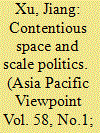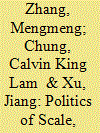|
|
|
Sort Order |
|
|
|
Items / Page
|
|
|
|
|
|
|
| Srl | Item |
| 1 |
ID:
187935


|
|
|
|
|
| Summary/Abstract |
Urban governance has been increasingly complicated by the rapid development of emerging industries in recent years. One example is the boom of China's intelligent connected vehicle (ICV) industry, in which governments and business interests are increasingly complicated in co-constructing a context-specific "framework of action" to tap the potential of new industries in managing radical urban development uncertainty. Against this background, this article examines the ICV industries in Hunan Xiangjiang New Area (HXNA), a national new area in Central China's inland province of Hunan. Despite keen competition from coastal cities, HXNA has managed to develop the ICV industry as its flagship sector to propel local economic development. Through tracing the ICV-induced development, this article demonstrates that HXNA's success owes much to a dynamic state–business interaction rarely seen in traditional industrial sectors. To explicate this interaction, this article seeks to move beyond the dichotomy between business-centric and state-centric interpretations of entrepreneurial urban governance to argue that state–business interactions are neither unidirectional nor fixed, but bidirectional, malleable and evolving constantly. Our findings underscore the importance of understanding the entrepreneurial economic landscape as co-shaped by both the state and firms in a temporally dynamic manner.
|
|
|
|
|
|
|
|
|
|
|
|
|
|
|
|
| 2 |
ID:
152526


|
|
|
|
|
| Summary/Abstract |
Over the past three decades, we have seen a flourishing of scholarship which explores the emerging political spaces and variegated scales of governance in China. This research draws on political economic tradition to argue that the way in which cities and regions are governed is indeed infused with socio-political struggles which are proliferating at a range of spatial scales. Such theoretical interpretation is illuminating, but it has been subject to increasing criticism from the poststructuralist approach that views scale as an epistemological construct. This paper uses the Pearl River Delta Intercity Railway System (PRD-ICRS) as a case study to challenge the onesidedness of both the political economy tradition and the poststructuralist approach in reading scale. It employs the “scale politics” thesis to argue that scale is more than a material existence (or institutionalised structure) that represents a particular arrangement of political power, being subject to perpetual transformation through regulatory projects and strategies. It is also a “representation trope” deployed in political discourses to acquire persuasive power to frame and legitimise these projects and strategies. Scale is thus both material and discursive. Understanding the two moments of scale enables a fuller dissection of political transformation.
|
|
|
|
|
|
|
|
|
|
|
|
|
|
|
|
| 3 |
ID:
187932


|
|
|
|
|
| Summary/Abstract |
Studies of state–firm relations in China have tended to adopt either a state-centric or a firm-centric approach to the research of state–firm relations, leading to a focus on the unidirectional causality from the state to the firm, or vice versa. Moreover, these studies have primarily focused on state–firm relations in traditional manufacturing sectors in a handful of fast-growing cities and regions, leaving a research gap on the interplay between state and business actors in emerging industries and some of the new state spaces of economic development. This special feature presents four articles which examine how state–firm relations unfold in these new sectors and spaces. Their findings show support for a dialectical approach which attends to how the state and the firm co-determine and co-constitute each other's interests and actions.
|
|
|
|
|
|
|
|
|
|
|
|
|
|
|
|
| 4 |
ID:
129085


|
|
|
|
|
| Publication |
2014.
|
| Summary/Abstract |
Chinese mega-city regions have become a new scale of capital acetimulation and state regulation. In recent years these regions have attracted much scholarly attention: however. the'growing research on regional spaces in China is marked by a lack of what we term "realpo- litik" and an absence of rigorous case studies. This study uses the "politics of scale" to empin'cally investigate the realpolitik factors in the intercity railway planning process in the Pearl River Delta. To this end. we establish a two-dimensional approach to unravel the intercalary and intercity politics during this process. W'e argue that in an institutional vacuum. ad hoc measures have been frequently used to facilitate interscalar and intercity bargaining. This case study also establishes a new perspective for Uinderstaiiding China's urhaii and regional transformation. Rather than treating the state as a passive agent. coping with the powerful forces of decentralization and market reform. we argue that the state has strategically redefined itself and has become even more sophisticated in its sIi1icturcs. functions. and tactics. The traditional one-sitled and unidirectional approach to state-space analysis cannot adequately address these issues. A new perspective that considers the politics of variotis scales is needed to study the emerging state regime in China.
|
|
|
|
|
|
|
|
|
|
|
|
|
|
|
|
| 5 |
ID:
175562


|
|
|
|
|
| Summary/Abstract |
The recent proliferation of China's railways has posed challenges to the dominance of the national-level railway authority on railway development. Since the 2000s, the planning of new railways has evolved into a politics of scale in which actors across multiple scales of government have bargained over railway alignment and station siting for their respective interests. This politics is shaped by the uneven bargaining powers of the contending state agents over railway planning. Interscalar division of regulatory oversight over strategic resources for railway development enables state agents at some scales to bargain more successfully, whereas variations in administrative and economic standing further differentiate the interscalar bargaining powers of municipal governments. Different results of bargaining across scales for each city have produced, as intercity railway planning in the Pearl River Delta illustrates, significant intercity variations in average travel times to the stations for the new railways that these cities share. Owing to the peculiar scalar distribution of the costs and benefits of the new railways, municipal governments with greater bargaining power have, contrary to traditional wisdom, bargained for less accessibility to intercity railway stations.
|
|
|
|
|
|
|
|
|
|
|
|
|
|
|
|
| 6 |
ID:
111874


|
|
|
|
|
| Publication |
2012.
|
| Summary/Abstract |
Neoliberalism has become dominant in both thought and practice throughout much of the world since the early 1970s. In China, neoliberal ideas are growing fast, even as it festers and stagnates in capitalist economies. To capture this process, many scholars have extensively studied market politics in China, demonstrating how state functions are rearticulated downwards and outwards to allow local discretion and market formation. The result is a burly wave of urban entrepreneurialism, which becomes a key municipal strategy to enhance place-specific, socio-economic assets. However, such arguments neglect a counter-trend in which the state has deterritorialised and recentralised some key functions. This paper draws on two cases in urban land administration and state planning regulation to argue that state functions are being reassembled as a new post-crisis political instrument to reassert the functional importance of top-down regulatory control. Economic decentralization is now counterbalanced by the rise of state strategies to control the articulation of scales through which a more centrally consolidated power can be achieved. Rather than viewing markets as taking over the state and local territorial discretion overshadowing hierarchical administration, the paper emphasises the important role of state and top-down regulation in the current post-crisis context under transition.
|
|
|
|
|
|
|
|
|
|
|
|
|
|
|
|
| 7 |
ID:
187936


|
|
|
|
|
| Summary/Abstract |
This study deploys a geoeconomics perspective to explore how the Belt and Road Initiative (BRI) has been implemented through economic means by states and firms in China and host countries to achieve strategic objectives. We first use three geoeconomic indicators to classify 74 Belt and Road countries' relations with China and unpack the key geographical features of BRI projects. Then, against this geoeconomics background, we select three BRI projects to explain the roles played by the Chinese state and firms with different ownerships in the BRI's execution. The cases are port development in Sri Lanka by China Merchants Port, a national state-owned enterprise; railway investment and construction in Laos and Thailand led by the Chinese government and state-owned firms; and industrial park development by China Fortune Development, a private developer. We argue that the BRI acts as a geoeconomics maneuver, propelled by a close state-business cooperation that is vital in enabling its success. In forging the BRI, the Chinese state shapes the overall strategic pathway. Nonetheless, it is the firms, both state-owned and private, that are increasingly implicated in co-constructing the project-based and context-specific "frameworks of action" with host countries' governments and business interests to manage overseas economic uncertainty.
|
|
|
|
|
|
|
|
|
|
|
|
|
|
|
|
|
|
|
|
|